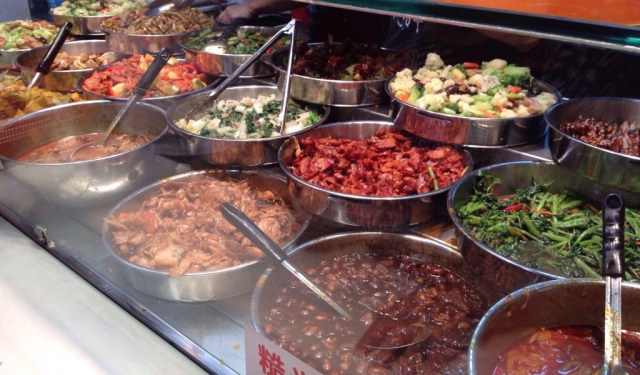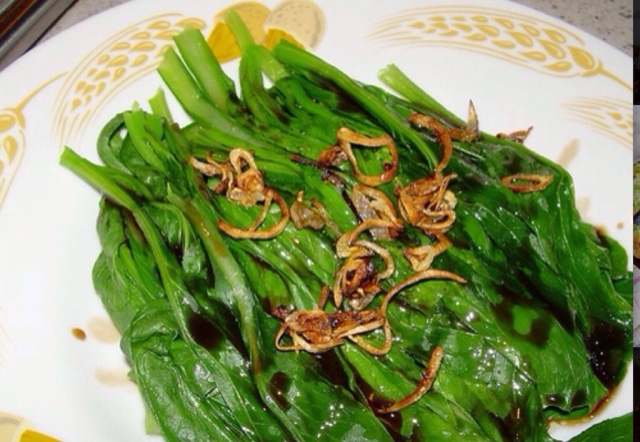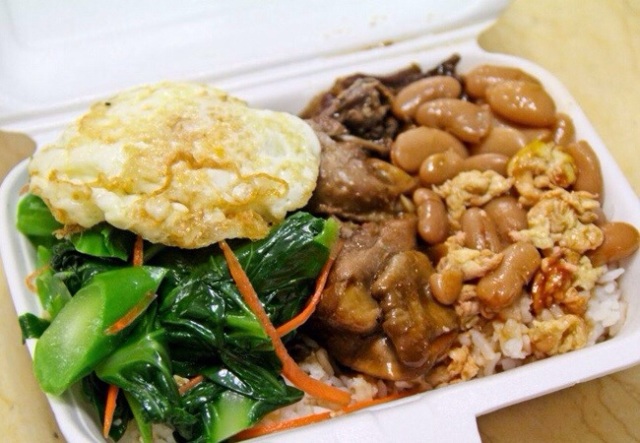My 72 yr old mum is currently working in a chain vegetable rice stall. She is still fit and healthy. She would rather work than stay at home. Every quarterly, the government even gives her some cash money credited to her POSB bank and CPF accounts. She belongs to a group of senior citizens who like to work even though the children give her monthly allowances to spend. She feels useful and independent working hard to earn some money.
After working for some time in one of the vegetable rice stalls – a chain of vegetable rice stalls all over the island owned by the same company, she found out lots of things happening behind the scene. Whenever I chat with her, she would provide me with details of the food preparation process, the number of staff running a typical stall, their nationalities, daily takings etc. In short, she gave me lots of insider information about her work there.
Basically, a typical vegetable stall in a HDB coffee shop is manned by 3 persons. The main player will be the cook who is the in-charge of the food stall. He is assisted by one staff in the morning and another in the afternoon until it closes for the day. Understandably, the in-charge works extra hard with the longest hours operating from about 8am till 9pm catering to the lunch and dinner customers. On top of their basic pay, they are also given incentive payment if collection exceeds the target. There are CCTV cameras all over the stall to monitor them. The boss hardly comes over except to collect the day’s takings. The cash register captures all transactions. The in-charge of the stall is usually a FT from neighboring countries and recently many from PRC. Few locals could undertake such a demanding job churning out simple meals at dirt cheap prices.
Due to time constraint with only one assistant, the in-charge who does the cooking of more than 20 dishes has got to be fast and energetic. As such, he is forced to take short cuts and cut corners. This is what is happening in the food preparation. For example, the vegetable is never washed at all. One method is to boil a big pot of water and dump the unwashed vegetable to half-cook it. Thereafter, it’s then stir fried to taste. I do not worry about dirt and slime on the stalks and leaves of the vegetables. I am more perturbed by the tons of insecticide residue on them. Just look at the beautiful green leaves where even worms would not feast. Surely it must be the insecticide that is keeping away the worms chewing on it. If it is not thoroughly washed and eaten by unsuspecting consumers, what would happen? Wonder no more why city folks like us are getting all kinds of illnesses especially colon cancer. Think of what I just sketched for your imagination. It is no joke and witnessed by my mum working there. As such, she always advises us not to consume green vegetable in a cooked stall except the bean sprouts where they got no choice but to wash them to clear the uneatable husks of the green sprouts. (tuagai)
Just to side track a little. When I was in Ipoh visiting the local eatery, I notice that the leaves of the vegetable are always punctured with holes and they don’t look appealing. When I commented about them comparing to those in Singapore that they are unattractive. The locals in Ipoh gave me an invaluable lesson telling me that it’s becuz tons of insecticide is sprayed on the vegetable that even worms avoid. In their case, no insecticide is used making it worm friendly. Which is more healthier in the long run? I was told that no matter how much you wash your insecticide laced greens, the chemicals will never go away completely. In the case of the typical food stall quoted above, it’s far worst than that.
Of course, the other option is to cook your own vegetable at home. But then that is not always possible due to our long hours of work, we simply do not have the luxury. As a last resort, maybe the organic vegetable which is far more expensive will be a much healthier choice since it is not grown in the soil and no insecticide is needed to keep away the worms.
I have elaborated on the no-washing of the vegetable in a typical food stall. What about the manner of preparation for other food such as chicken wings, meat, fish etc. Yup, they simply throw into the hot boiling oil in the wok and deep fry them. Rice is never washed at all before it’s put in the rice cooker to steam. Another observation made by my mum is that all those ingredients and condiments such as salt, oil, sugar, black or light soy sauce kept in small containers meant for cooking are all left overnight without any lids to secure them. Lizards, rats, cockroaches having a big party throughout the night and then they are used in the cooking the next day for our own consumption. Frightening? Flabbergasted? That is why my mum brings her own food to work even though free meals are provided. She would keep far away from those cooked food cuz she knows how they are prepared.
When I wonder why NEA is not taking enforcement action? Maybe, they just look at the appearance of the stall, the dressing of the staff, ensure that there is no rat running around and no cockroaches flying about and they deem to have done their job. Some time ago, I did blog about how drinks such as coffee or tea are prepared by hawkers with pictures taken but there seems to be no action taken. Pls refer to the the article here. Link
From my observation, only those Malay stalls seem more hygienic than the Chinese or Indian food stalls. I have yet to come across Malay stalls out-sourced to FTs. The Malay stalls are usually run by locals. That is why Malay food usually costs more than Chinese food. I would rather pay more for Malay cooked food than those Chinese cooked food which is comparatively cheaper. Just be more observant and look out for yourself the next time you consume your food in a hawker centre or coffee shop. Watch what you eat.
Read related article here link.





– WOW so insightful
– I cook at home nearly everyday now
– Sian of outside food, inconsistent, oily, over salted.
– I shall stick to the old school family run economy rice stall that I am familiar with and brave the long queue
– Rather then the fast and convenient chain economy rice stall
– WOW so insightful
Oh, and the nasi padang stall in Cuppage basement is very good, average price $5 and their food is quite top notch.
LikeLike
Hi Lina,
Thank you so much for your “insightful” comments. Hope to see you more often. Cheers!
LikeLike
Thanks for the “behind the scene” information. I miss those mom and pop small operation hawkers where things are closer to home cooked.
LikeLike
Very true.
The Hygiene standard of food and
beverage caterers are pathetic. Even
the cooking utensils and cutleries are
not as clean as desired.
‘Bopian’ consumers have little choice,
especially workers with only about
half an hour meal break. These days
queing at popular stalls alone could be
half an hour or more.
What about the Quality of the ingredients?
Are there expired items being dished out
to consumers? Your guess is as good as
mine. Remember we are also expose to
genetically modified ingredients.
Singaporeans are living better now than
before and will be further improved as we progress, some say. It can’t be further from the Truth.
patriot
LikeLike
Pingback: [Gintai_昇泰 Blog] Health warning : Watch what you eat! | Developed
Haha … that’s why I have a cooking blog.
LikeLike
Pingback: Hawker Leaks | Dr Chan's Kitchen
Gintai.
Hope by writing this, it will not get your mom in trouble, but really thank you for your insight, I thought I was the only one that is seeing these things happen but you have proven that I am not the only one.
Many a time the table cloth that are used is never wash, and is used to clean anything and everything. The pricing of each dish which had and was compulsory to be shown yesteryears is missing in practically all stores now, ordering the same food 2 days in a roll gets you scratching your head as the price can be different, not by a few cents but it can be more than a dollar, the portion given is also very different, and I have seen food drop onto the floor, pickup and cook without the dirt water being rinse off.
Thank You.
kaki
LikeLike
In fact we told her not to work but she refuses to listen. We rather she not working. Thks for your concern.
LikeLike
She has to work, because as an elderly, we can get depressed pretty easily and especially with nothing useful to do it, makes us feel useless. Human beings are wired to want connection. Hope you understand her feelings. Only thing is, perhaps she can change her place of work.
LikeLike
NEA is supposed to get all those who are involved in the preparation and handling of food, such as chefs, cooks, kitchen helpers etc. registered with them. But in reality, did NEA really enforced this rule?. Pathetic!
LikeLike
Please lah, you ai pi, ai qi, ai tua liap ni….
NEA make the company hire one more kitchen staff to wash the veggies want or not? Then the price go up $0.50, you will be the FIRST one to kao peh kao bu about how the government is making things to expensive. Pathetic!
LikeLike
Even if washing of leafy vegetables is done in home cooking, how effective is it in removing insecticides? How thorough should the washing be? Or can it even be totally washed off?
That’s why I eat only carrots, cucumbers, gourds, pumpkins, onions, garlic, cabbages (all can peel), and dried mushrooms for non meat items in home cooking.
Safer? What do you think?
LikeLike
dear gintai, there was this beehoon/cai png stall in my neighbourhood. i notice they sell fried taukwas that are dark in color. normally if u fried taukwa in brand new oil, they would be bright yellow in color. hencei suspect the stall is either refrying leftovers taukwas or they r uding old/recycled cooking oil.
LikeLike
As a matter of fact, all the fried food using recycled oil. They just top up the oil only. Unlike home fried things where we use only once. Recycled oil is poisonous. Don’t eat fried things often esp fried chicken wings. Go for the BBQ version.
LikeLike
The taukwas could be those braised in black soy sauce or those drier types also braised in black soy sauce. Topping of oil is standard practice even in Michelin-starred restaurants and those in 6-star hotels. The trick is to know how many rounds to use before changing. Some stuff are never thrown. Bakeries and restaurants operating for decades pride themselves in continuing topping up of yeast to the original lump of mother yeast or the original portion of stock used to braise soy sauce dark or goose. Good to acquire some knowledge before jumping to uneducated conclusions. Want to play safe? Raise your own meat and grow your own vegetables. And do your own cooking but how practical is that?
LikeLike
It may surprise you that I’ve cooked things in less time than it takes to walk down to the stall and wait in the queue. And I’m not talking about instant noodles.
LikeLike
i can tell the difference between black soy sauce taukwas and refried taukwas.
btw i do grow my vegetables in those farm plots the RC setup
LikeLike
I heard Khoo Teck Puat hospital also have farm plots, but at its roof top. Maybe RCs should explore doing that on HDB roof tops.
LikeLike
Agree Malay stalls food cost more as the food used various spices for the dishes n prepared hygienically.
LikeLike
Truly valuable lesson learnt here about outside food but whether the food are better prepared or cleaner has nothing got to do with local or food store run by foreigners.
No one can deny the fact that they have seen before local “Uncle” and “Auntie” handles food in appropriately. And surprise surprise, imagine what goes behind the kitchens of big eateries and f&b establishments….
Half the time I take the stance of ignorance is a bliss. Enjoy the food and don’t think so much about how it’s prepared.
LikeLike
Scare this scare that. Might as well don’t eat. Wondering what will your reaction be when you see few worms in your vegetables. LOL!
LikeLike
Someone once said, “Working in the food industry, is a career where one cultivates his/her morals (做吃的, 是一种养心的事业)”. This is so true…
Visible areas (store front area and actions) are govern by authorities, non-visible areas (kitchen and back end actions) areas are govern by what? One’s conscience (良心).
Simple actions like bring a dropped spoon to wash first or putting it straight back into the holder is a tell tale sign of the culture in that kitchen. I did both praise and told off managers off before in the restaurants for their staff actions.
LikeLike
Hi, you can refer to AVA website for pesticide safety on locally produced and imported vegetable/fruits if your concern is the amount of pesticides used on them. http://www.ava.gov.sg/FoodSector/FoodSafetyEducation/Food+Facts/AllAbtFruitsAndVeg/
LikeLike
You mean your mum is working at Haig Road vegetarian food stall? If yes, when did she started working there? How come I never see her before? Sorry, but I am just being curious.
LikeLike
In general, most of the food stalls regardless in food courts/hawker centers operates the above way, not only stalls selling economical rice. I just keep my fingers crossed that the cook washed their hands the right way and all the food are cooked “hot” enough that 99.9% of the germs are killed.
LikeLike
well, then what can we eat? other hawkers not selling fancai will do the same isnt it? and what about those cafe and restaurants, u pay more, and trust them that they will do a “cleaner” job?
LikeLike
Surely you should know that parboiling vegetables in boiling water will remove the pesticide. one source http://www.cfs.gov.hk/english/faq/faq_07.html says to either soak vegetables for one hour or parboiling for 1 min and discarding water.
LikeLike
Gintai wants to expose this and that. But make sure you get your facts right first.
LikeLike
instead of complaining about it, why dont you start the change?
if you are not willing to change it, then just reserve these comments to yourself.
LikeLike
There is another bad habit of this chap chye rice chain.
Once, I was in a toilet and this guy who is employed as a cook in the stall came in and did his stuff
at the latrine.
When he finished, he didn’t even bother to wash his hands and went back to the stall serving food.
From that day on, I stopped patronizing that chain. But there again, most of this kind of business would be run at about the same hygiene standard.
I blame whichever government agency that is supervising food preparation in Singapore for this outrageous situation.
They are derelict in their duties and deserved to be censured.
These food businessmen are slowly poisoning Singaporeans who have no choice but to eat out.
LikeLike
Great you changed and updated the photos to more relevant, less misleading ones.
LikeLike
Pingback: Heartland horror stories: Economy rice stalls don’t wash their vegetables before cooking | Mothership.SG